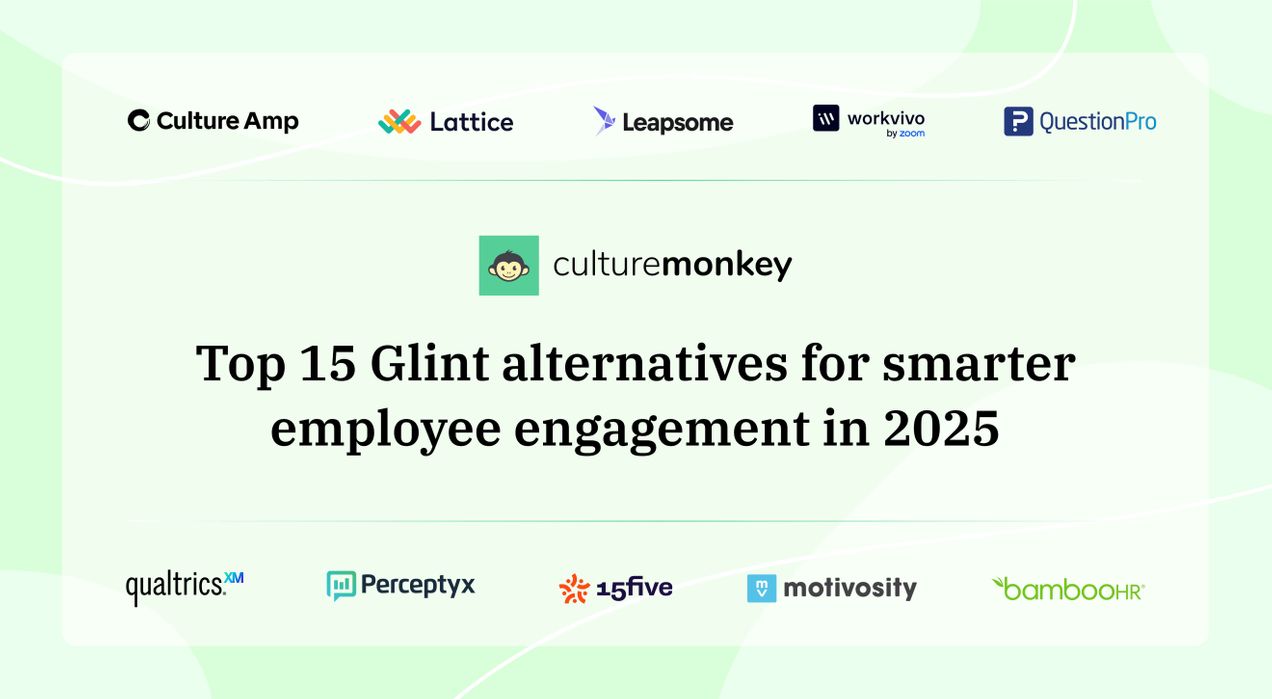Employee engagement consultant vs. software: Finding the right balance in 2025

Imagine a master chef crafting a gourmet meal. The chef, with years of expertise, knows how to blend flavors and create culinary magic.
Now, imagine giving this chef state-of-the-art kitchen tools that automate repetitive tasks and provide precise measurements. While the chef’s skill remains the centerpiece, the tools amplify their efficiency and creativity.
This question is more relevant than ever in 2025, as organizations strive to balance the personal touch of human expertise with the scalability of technology.
Just as a conductor can interpret subtle cues and inspire musicians, consultants bring tailored strategies and deep insights into employee behavior. On the other hand, software acts as the metronome, providing precise, real-time data and tools to keep everyone on tempo.
Both approaches have their strengths, but finding the right balance is crucial for achieving a symphony of engagement. This blog will explore the roles, benefits, and challenges of employee engagement consultant and software, comparing the values and how they complement each other.
What are the three types of employee engagement?

Employee engagement can be categorized into three core types: actively engaged, not engaged, and actively disengaged employees. Understanding these categories helps organizations identify and assess where their workforce stands and how to tailor engagement strategies effectively.
1. Actively engaged employees
These employees are the driving force behind any successful organization. They are passionate, motivated, and committed to their work, often going above and beyond their responsibilities.
Actively engaged employees serve as role models, inspiring their peers and contributing to a positive workplace culture. Organizations with a high proportion of actively engaged employees tend to see increased productivity and reduced employee turnover.
2. Not engaged employees
This group includes individuals who are neither fully invested in their work nor completely detached. They perform their duties without much enthusiasm or initiative, often sticking to the bare minimum.
While they aren’t disruptive, their lack of engagement means untapped potential for the organization. Identifying and re-engaging this segment is critical for organizational success and unlocking greater team performance.
3. Actively disengaged employees
Actively disengaged employees feel disconnected from their work and the organization’s goals. They may harbor resentment and, in some cases, actively spread negativity, impacting team morale.
This group poses significant risks to organizational health and requires focused intervention to address underlying issues. Early identification is key to minimizing their impact.
Who are employee engagement consultants?
Employee engagement consultants working for employee engagement consultancies are professionals who specialize in assessing and improving employee engagement survey results and the connection between employees and their workplace.
By leveraging expertise in organizational psychology, human resources, and employee behavior, these consultants design strategies to enhance job satisfaction, productivity, and loyalty.
Their goal is to foster a thriving work environment where employees feel valued and aligned with organizational objectives.
These consultants often serve as external advisors, bringing a fresh perspective to company dynamics. They identify key drivers of engagement, such as leadership effectiveness, workplace culture, and employee recognition programs. Through surveys, focus groups, and research and data analysis, they uncover insights that internal teams might overlook.
Beyond diagnostics, employee engagement consultants provide actionable recommendations tailored to an organization’s unique challenges.
Whether it's improving communication, fostering inclusivity, or designing leadership development programs, their solutions aim to create a more highly engaged employees and cohesive workforce.
Many organizations also rely on employee experience consulting firms for long-term guidance, integrating best practices into ongoing business strategies. By aligning employee experience with business goals, they drive sustainable success for organizations across industries.
What does an employee engagement consultant do in a company?
An employee engagement consultant plays a pivotal role in bridging the gap between employees and organizational goals. Here are the 5 key responsibilities they undertake to create a more engaged workforce:
1. Conducting engagement assessments
Consultants use tools like surveys, focus groups, and interviews to gauge employee sentiment and identify engagement gaps. These assessments help uncover issues such as lack of recognition of commitment, poor communication, or leadership challenges. The insights serve as a foundation for tailored engagement strategies.
2. Developing tailored engagement strategies
They design customized plans that address an organization’s unique needs, considering factors like company culture, industry, and workforce demographics. These strategies might include leadership training, rewards programs, or initiatives to Foster inclusivity. Their goal is to align employee satisfaction with business objectives.
3. Providing leadership coaching
Consultants train managers to make clients become better leaders by enhancing their communication, empathy, and conflict-resolution skills. Effective leadership is often the cornerstone of engagement, and consultants ensure managers are equipped to inspire their teams.
4. Implementing employee feedback mechanisms
They set up feedback systems to facilitate open communication between employees and management. This includes tools like anonymous surveys or digital platforms, ensuring employees feel heard. Continuous feedback helps organizations stay agile and responsive.
5. Measuring and analyzing engagement outcomes
Employee engagement consultants track the success of implemented strategies using key metrics like employee retention, satisfaction scores, and productivity levels. By analyzing this data, they fine-tune approaches and provide ongoing recommendations for improvement, ensuring long-term impact on business results.
Challenges that employee engagement consultants face

Despite their expertise, employee engagement consultants often encounter significant obstacles when working with organizations.
These challenges stem from organizational resistance, evolving workplace dynamics, and complex employee needs. Overcoming these hurdles is crucial for driving effective employee engagement consulting strategies.
Resistance to change
Organizations often resist adopting new engagement strategies due to fear of disrupting established routines. Consultants must overcome skepticism and persuade the leadership team of the long-term benefits. This requires strong communication skills and data-driven evidence.
Lack of leadership buy-in
Without strategic planning and active support from leadership, engagement initiatives can fall flat. Convincing leaders to invest time, resources, and effort into these programs is a recurring challenge. Consultants must align strategies with business goals to gain leadership trust.
Diverse workforce needs
Modern workplaces are increasingly diverse, with employees having varied preferences, values, and motivations. Balancing these differences while crafting a unified engagement approach demands creative and flexible solutions.
Data collection and analysis limitations
Gathering accurate employee feedback and interpreting it effectively can be difficult. Consultants often face challenges with limited data access or insufficient response rates to survey results. Advanced tools and methodologies are essential to bridge these gaps.
Sustaining engagement long-term
Even when initial strategies succeed, maintaining high engagement levels over time is challenging. Consultants must continually adapt plans to address changing organizational goals and employee expectations. This requires ongoing monitoring and iteration of action plans.
How has employee engagement in HR evolved in 2025?

Organizations are prioritizing personalized approaches, leveraging data, and fostering inclusivity to keep employees motivated and aligned. Here are five key ways it has evolved:
- Increased focus on hybrid work engagement: With hybrid work becoming the norm, HR teams now emphasize engagement strategies that connect remote and on-site employees. Virtual team-building, inclusive communication platforms, and flexible policies ensure that all employees feel equally valued.
- Data-driven decision-making: The use of advanced analytics and AI tools has revolutionized engagement efforts. HR now relies on real-time data to monitor employee sentiment, predict disengagement risks, and implement timely interventions tailored to individual needs.
- Enhanced personalization: One-size-fits-all engagement strategies have given way to more customized approaches. HR designs programs that address employees’ unique preferences, career goals, and wellness needs, fostering deeper connections and satisfaction.
- Stronger emphasis on inclusivity: Diversity and inclusion have become integral to engagement. HR ensures that engagement initiatives promote equity, provide safe spaces, and celebrate diverse backgrounds, enhancing belonging and collaboration.
- Integration of employee experience technology: HR departments are increasingly using tools like employee engagement software to streamline feedback collection, track engagement metrics, and automate recognition programs. These technologies make engagement initiatives more efficient and impactful.
What is employee engagement software?
Employee engagement software is a digital solution designed to help organizations assess, manage, and enhance employee engagement.
These platforms streamline processes such as feedback collection, performance tracking, and recognition programs, making it easier for HR teams to foster a motivated and connected workforce. With data-driven insights, these tools empower leaders to take actionable steps toward boosting employee satisfaction and productivity.
This software often includes features like pulse surveys, goal-setting tools, surveys, and performance analytics to gauge employee sentiment and track progress over time.
By centralizing data and feedback, it provides a clear picture of engagement levels and areas that need improvement. These insights enable organizations to make informed decisions that align employee well-being with company objectives.
Additionally, employee engagement software plays a crucial role in hybrid work environments, where maintaining connection and communication is challenging. Organizations that hire dedicated software developers can customize these platforms to facilitate virtual recognition programs, promote collaboration, and ensure employees feel valued no matter where they work.
By automating repetitive HR tasks and providing actionable insights, these platforms allow HR teams to focus on strategic initiatives.
As organizations adapt to the evolving workplace dynamics of 2025, employee engagement software has become an indispensable tool for building strong, resilient, and highly engaged teams, bridging the gap between leadership and employees effectively.
Benefits of using employee engagement software

Employee engagement software has become a vital asset for organizations striving to enhance workplace satisfaction and productivity. By automating processes and providing real-time insights, these tools empower HR teams to make strategic decisions. Here are some key benefits of implementing employee engagement software:
- Streamlines feedback collection: The software makes it easy to gather employee feedback through features like pulse surveys, anonymous comment boxes, and digital suggestion platforms. It ensures employees have a voice and provides HR with a clear understanding of workplace dynamics. Regular feedback loops help organizations stay agile and address issues promptly.
- Boosts employee recognition: Recognition tools within the software enable both managers and peers to acknowledge employee contributions instantly. Features like badges, points, and rewards foster a positive culture of appreciation. This not only boosts morale but also strengthens team bonds and overall engagement.
- Enhances communication: Engagement software bridges communication gaps by providing centralized platforms for sharing updates, hosting discussions, and resolving queries. This is especially critical in hybrid work settings where face-to-face interaction is limited. Transparent communication fosters trust and keeps employees aligned with organizational goals.
- Provides real-time analytics: The software offers dashboards and reports to monitor engagement metrics, employee sentiment, and productivity trends. These real-time insights help HR teams identify potential issues before they escalate. Data-driven strategies lead to more effective decision-making and sustained engagement.
- Improves employee retention: By identifying disengagement trends early, the software helps organizations address concerns that lead to turnover. Proactive measures like enhanced communication or personalized development plans improve employee satisfaction. Engaged employees are more likely to stay loyal and contribute to organizational success.
- Supports personal development: Many platforms feature goal-setting, performance tracking, and learning modules that empower employees to grow. These tools encourage skill development and align personal growth with company objectives. Employees who see opportunities for advancement are more engaged and committed.
- Saves time and resources: Automating tasks such as survey distribution, feedback analysis, and recognition processes reduces administrative burdens on HR teams. This efficiency allows HR professionals to focus on strategic initiatives. Organizations save valuable time while maintaining robust engagement efforts.
Comparing human consultants and software solutions
When it comes to enhancing employee engagement, organizations often face the decision of whether to rely on human consultants or opt for software solutions. Each option offers unique advantages, and understanding their key differences helps in selecting the right approach. Here's a comparison between the two in a clear, concise manner:
| Aspect | Human Consultants | Software Solutions |
|---|---|---|
| Customization | Consultants provide tailored strategies based on company culture and needs. | Software offers customizable templates but may lack deep personalization. |
| Cost | Typically more expensive due to consulting fees and ongoing involvement. | Generally more affordable with a one-time or subscription-based cost. |
| Expertise | Consultants bring specialized knowledge and experience in employee engagement. | Software provides data-driven insights but lacks human expertise. |
| Real-Time Analytics | Consultants offer qualitative analysis through interviews and focus groups. | Software delivers real-time quantitative data on employee sentiment and engagement. |
| Flexibility | Highly adaptable, adjusting strategies in response to company shifts or challenges. | Limited flexibility; changes often require software updates or custom programming. |
| Scalability | Consultants may be limited in their ability to scale across large organizations. | Software solutions easily scale to accommodate large, diverse workforces. |
| Implementation Time | Implementation can take longer due to research and planning. | Software can be deployed quickly, providing immediate access to engagement tools. |
How does employee engagement software enhance the consultant’s toolkit?

Employee engagement software complements the work of consultants by providing them with powerful tools to streamline processes and gain deeper insights into workforce dynamics.
With real-time data, automation, and advanced analytics, consultants can focus on high-level strategy while the software handles operational tasks. Here are five ways employee and engagement survey software enhances a consultant’s toolkit:
- Provides real-time data: Consultants can access real-time analytics on employee sentiment, engagement levels, and overall performance. This immediate feedback allows them to make informed decisions and adjust strategies quickly, ensuring engagement efforts remain effective and responsive.
- Streamlines data collection: Instead of relying on traditional methods like surveys or focus groups, consultants can leverage software tools to collect continuous feedback from employees. This streamlines the data collection process, reducing time spent on Manual tasks and allowing consultants to focus on analysis.
- Automates recognition programs: Employee engagement software includes features for peer-to-peer recognition and reward systems. Consultants can implement automated recognition programs that are scalable, ensuring every employee feels valued, regardless of company size.
- Enhances communication and collaboration: With communication tools integrated into the software, consultants can help organizations Foster transparent conversations and collaboration between teams and management. This strengthens relationships, builds trust, and improves the overall work environment.
- Tracks engagement progress over time: Consultants can use the software to track changes in employee engagement levels over time, identifying trends and pinpointing areas that need further attention. This ongoing monitoring ensures Long-term success and helps in adjusting engagement strategies as necessary.
Features to look for in employee engagement software
When selecting employee engagement software, it’s important to focus on features that can effectively enhance the employee experience and provide actionable insights. The right features not only streamline processes but also Foster Long-term engagement. Here are the key features to look for in employee engagement software:
- Pulse surveys and feedback tools: A key feature is the ability to conduct pulse surveys that collect frequent, real-time feedback from employees. This helps organizations measure engagement levels consistently and make timely adjustments to improve employee satisfaction.
- Recognition and rewards system: Look for platforms that allow employees to recognize their peers through points, badges, or rewards. An integrated recognition system helps boost morale, encourages positive behavior, and reinforces a culture of appreciation across the organization.
- Analytics and reporting dashboards: Advanced analytics tools and customizable dashboards enable HR teams and consultants to visualize engagement data in real time. This helps to track trends, identify disengagement risks, and measure the impact of engagement initiatives.
- Goal setting and performance management: Effective engagement software should support goal setting, tracking progress, and providing feedback on employee performance. This ensures employees remain focused on their objectives while receiving constructive input from managers.
- Employee development and learning tools: Look for platforms that integrate learning and development features, allowing employees to track their growth and development. Providing access to training opportunities enhances personal growth, which directly impacts engagement and retention.
- Communication and collaboration tools: The software should include features that enable seamless communication and collaboration across teams. This fosters a sense of connection and alignment within the company, regardless of work location.
- Anonymous feedback options: Offering employees the ability to provide anonymous feedback creates a safe space for sharing concerns. This feature promotes honesty and transparency, helping HR and leaders address potential issues without fear of retaliation.
Conclusion
Employee engagement software is a game-changer for organizations looking to boost workplace satisfaction, productivity, and retention. By providing real-time data, automating key processes, and offering tools for recognition and communication, these platforms significantly enhance both the employee experience and the consultant’s toolkit.
Whether you're a consultant looking to streamline your strategies or an HR team aiming to create a more highly engaged workforce everywhere, selecting the right software can make a world of difference. If you’re looking for a powerful and intuitive solution, CultureMonkey offers a comprehensive platform to elevate employee engagement in your organization.



